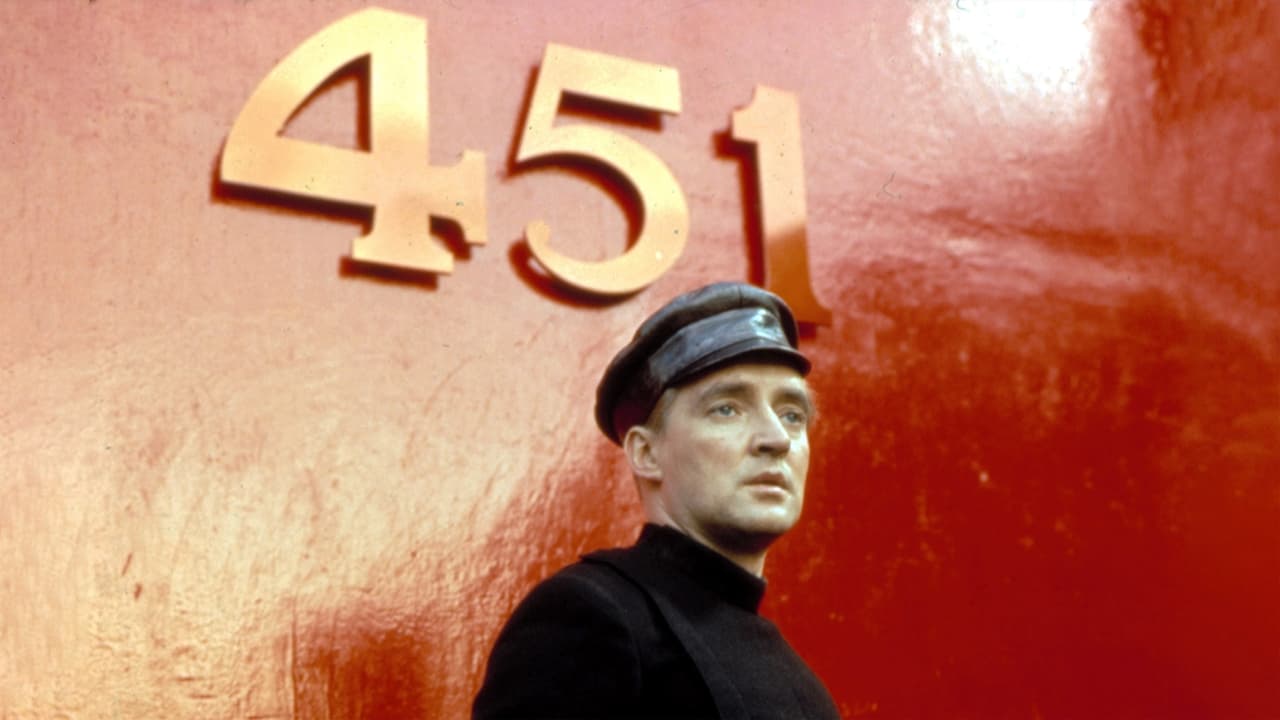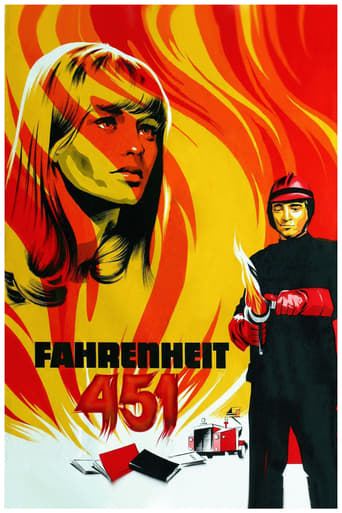

Fantasist Ray Bradbury wrote FAHRENHEIT 451 about new technology rolling in at the time (1953). His theme was originally a critique of the new media, including television--a medium where, too often, then thinking is done for the viewer. Whereas, with books, effort is involved just in hefting it up and opening the cover; and thinking is involved in reading and comprehending.Unfortunately, even by the time the movie came out nearly ten years later and certainly since, pedagogues had taught young readers it was about censorship. The misunderstanding was so serious, once when Bradbury gave a talk at the college and said his book was a media critique, the students protested that HE was wrong.Try watching this movie (if reading a book is too much trouble) with Bradbury's original theme in mind, and think about society half a century later, where books are often considered passe and we're surrounded not only by an exhausting variety of choices on television; where we can read books online or on downloads; and where we are drowning in Internet social media.As for the movie, Julie Christie is always welcome, as is the underutilized Oscar Werner. Personally, I'm no fan of Truffaut and wish someone else directed the thing. However, I like the hopeful ending. The images of book-burning seem geared more to the alternate/censorship application of the story, but that's a failure on the part of the filmmakers to foresee a time when computers would dominate the reading landscape.Compare the book-burning images to the scene in Pal's TIME MACHINE where the time traveler finds the Eloi have plenty of books--but when he picks one up it crumbles to dust because no one has touched it or bothered to preserve what's in it. That brings you closer to Bradbury's vision.
... View MoreA fair adaptation of a quite brilliant novel of the same name by Ray Bradbury (1953). As expected from a movie made in the 60's, there is no CGI or movie effects whatsoever, and for this reason the spirit of a dystopian work was uphold. However, the differences between this and the novel account for my personal preference for the novel: 1/All the scifi elements are dropped, which kinda enhances the idea that human intelligence slows down due to an oppressive society. This is not necessarily a bad thing, it's just I so much prefer the idea that society has developed great technology that enables one person to manipulate it and stands atop of the world. That's just more dystopian to me. 2/The ending scene really bothers me. I can't be the only one who hates it. Specifically the scene where a near-dying man recites Robert Louis Stevenson to his grandchild. To me, it feels as though it's just rote memorization without a precise and spontaneous appreciation and appraisal of the literary work.
... View MoreI just viewed the Blu-Ray version of "Fahrenheit 451" last night, and by coincidence, I just finished with the audiobook version read by Bradbury himself a few weeks ago. My initial impression is that Truffaut did his best to do what Bradbury most certainly accomplished; to instill a love and enduring respect for the written word, and by natural extension, ideas and thoughts that you, the reader, may not be too comfortable with, but realize must stand for thought to remain free.That being said, substantial cuts had to be made. Fabre, the old craven professor and Montag's "silent partner" from the book is gone, as is the sinister and ruthless Mechanical Hound. Clarisse, killed off early in the novel, lives right up until the end, and the apocalyptic war which is the climax of the novel is dispensed with. The most glaring shortfall, perhaps, is in the manhunt for Montag; a pulse-pounding, suspenseful fifth of the novel, it is here shrunk down to approximately three minutes of screen time, if that. Even more regrettable, Truffaut resorts to some cheesy green-screen effects of flying policeman to try to cough up a tiny bit of that excitement.But give Truffaut his due. He had the good sense to hire Herrmann for the soundtrack, which, IMHO, is probably one of the Maestro's best; he had just gotten fired from Hitchcock for his dissonant and rejected score for "Torn Curtain," and no doubt Herrmann wanted to prove to the world he still had the goods. Sumptuous and international in flavor, Herrmann delivers brilliance which really helps the visuals come alive.Truffaut's visual sense, OTOH, is economical, but effective, particularly in the scene where Clarisse's aunt defiantly dies with her precious pile of books when the firemen come calling. His presentation of the ubiquitous and mind-controlling tele-screen is scaled down from Bradbury's description, but eerily prescient, looking just like the flat screen TVs we are now using in 2016.In the Blu-Ray version, saturated colors leap off the screen in the outdoor sequences, and are muted for interiors. The extra definition is especially appreciated for the book burning scenes; you can read the text right off the page, and you may even spy a MAD paperback with Alfred E. Neumann's infamous face if you keep a sharp eye out.Bottom line: the book is much better and a more powerful experience, but watching Truffaut's version of "Fahrenheit 451" today, you may feel a wee bit uncomfortable that Bradbury's warning has not been sufficiently heeded. When is the last time YOU have read a book cover to cover, particularly of an author's ideas you don't particularly agree with?
... View Moreits virtue - preservation of the spirit of novel. its source of seduction - nuanced use of the images from novel. its role - to remind the essence of dictatorship. short - a beautiful film about censorship who remains an useful example of fine adaptation. a film about the freedom who, with its , at first sigh, simplicity, represents a wise portrait of terror, selfish, hope and its fragility, courage and the importance of truth at the level of individual conscience. a film about beauty. and, maybe, about books. seductive and convincing and useful and charming. because it has the tools to be one of the films who transforms the vision of viewer about reality. as adaptation. but, more important, as a honest film.
... View More